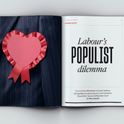Mendacity and caprice have always been found in politics, yet until recently there was a certain price to be paid. But no longer perhaps, and not only because of Donald Trump. Around the world, from Jair Bolsonaro in Brazil (whose ruinous stance on the Amazon Julia Blunck exposes) to Viktor Orbán in Hungary, a shameless new form of governance is on the march. It trades in feelings not facts, nostalgia not progress, grievances not solutions, and chauvinism rather than co-operation. From behind a cover of ancient hatreds and hyped-up modern threats, it disdains established processes and norms, and manoeuvres itself into a position where ordinary rules do not apply.
I hesitate before pinning the label of “populism” on this illiberal semi-democracy. A measure of populism is unavoidable in any democracy, and has historically sometimes been a necessary corrective to complacent establishment assumptions, about the economy in particular. But for want of a short-hand, it will have to do, as this month’s Prospect asks whether Britain is ripe to be blown off-course by this ill political wind.
Go through the list of conditions in American society on which Trump preyed, and most are here. The long slump and its aftermath? Obviously. A deeper rot in industrial towns, and bewilderment with modernity in the countryside? For sure. A sense of lost greatness? In spades. A generation of immigration having run at a rate that is exceptional by historical standards? Absolutely, and again exactly as in America a very large chunk of the electorate feels uneasy with this change, an unease which Londoner Tom Smail gives voice to.
Even without the shambolic, interminable saga of quitting Europe, populist nationalism would probably find a sizeable receptive audience at the moment. But add in the growing sense of a Brexit betrayal, artfully stoked by Nigel Farage in the undeniably odd European parliament elections in which anti-Brexit forces are hopelessly splintered, and this receptiveness is bound to increase.
"Johnson is, perhaps, too frivolous a figure even to rank as a populist"
All this poses, as Steve Bloomfield forcefully argues, some sore temptations for the Conservative Party, which it does not seem in a mood to resist. Through their long and shape-shifting history, Britain’s Tory tribe has been many things—isolationist, imperialist, doctrinaire and pragmatic—but, at least when in power, it has never before fully embraced populist governance. There are still many within it, such as the newly-promoted International Development Secretary Rory Stewart who I interviewed in depth on our website in April, who are desperate that their party should eschew simplistic cheer-leading and crass finger-pointing, and define itself instead through, in Stewart’s phrase, practical engagement “with the world as it is.”The great difficulty for such moderates is that in her first flash in power, Theresa May allowed the whole Brexit discourse to be framed in such a crude way that speaking up for the traditional conservative virtue of compromise is now to risk sounding compromised. More than that, as Elinor Goodman highlights in a fascinating dispatch from the countryside, rural England—home to many of the small cadre of Tory members that will soon pick a PM—has long been feeling like its traditional way of life has been sold down the river. No wonder most of the winks from Conservative wannabes—including the bookies’ clear favourite, Boris Johnson—mix nationalism and nostalgia. He is, perhaps, too frivolous a figure to count as a consistent populist, or indeed a consistent anything else. But when the mood takes him he can mix feel-good flag-waving and divisive taunting like nobody else in the business.
Whether it is Johnson or somebody else who eventually emerges, the next occupant of No 10 is likely to get there after making a populist pitch. Under our make-it-up-as-you-go-along constitution, whose shortcomings we exposed in our last issue, they will have no immediate obligation to face the people if the timing doesn’t suit, and will have more leeway than most world leaders can dream of to rewrite the political rules. Faint liberal hearts, inside and outside the Conservative Party, might be fluttering at this point. Before panicking, it is as well to read Bloomfield’s conclusion: populism can often prevail in individual elections, but deep social tides of diversity and education are at work which could ultimately limit its appeal. The Tory temptation is stark, but in time it may prove to be a Tory trap.












